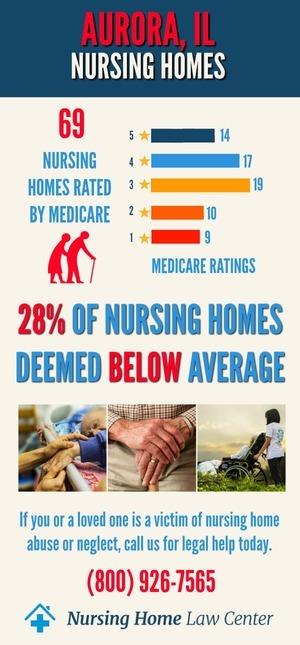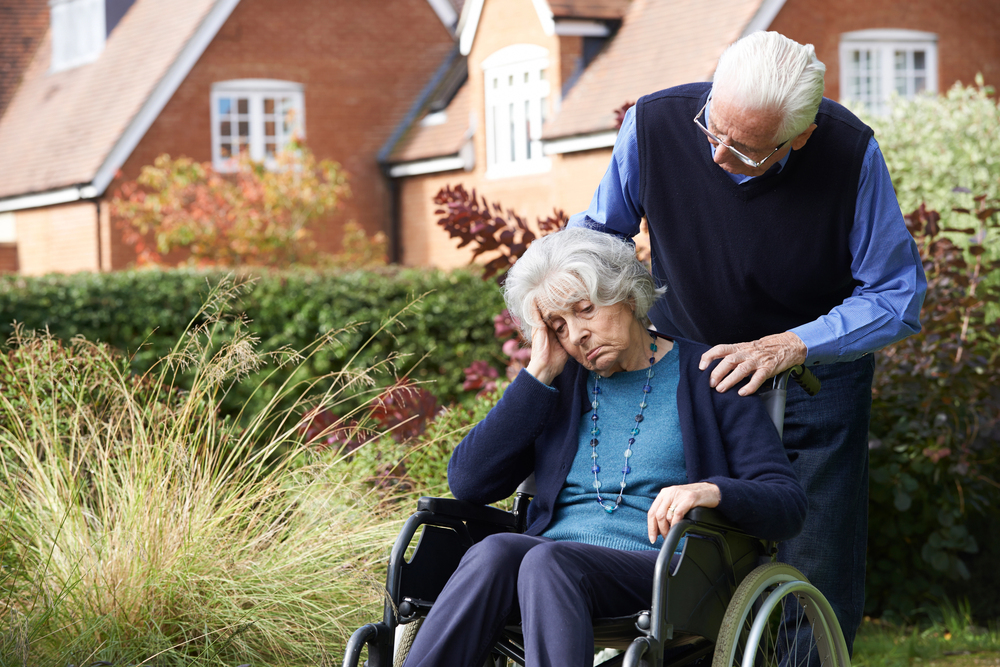The Nursing Home Law Center is committed to providing the legal resources necessary to hold negligent facilities accountable.
Aurora Nursing Home Abuse Lawyer
Compensation for Aurora Nursing Home Abuse Victims & Family Members

Licensed in Illinois
If your elderly loved one has suffered mistreatment in a nursing facility, an experienced Aurora nursing home abuse lawyer can help you take legal action. At Nursing Home Law Center, we represent victims of nursing home abuse and nursing home neglect across Illinois, helping families hold responsible parties accountable when abuse occurs.
Whether your case involves emotional abuse, physical harm, sexual abuse, or financial exploitation, our legal team is here to guide you through the legal process. We offer a free consultation to review your case, explain your rights, and help you pursue financial compensation for your loved one’s injuries and suffering.
We can help you take legal action against facilities such as:
- Jennings Terrace
- Highlight Healthcare of Aurora
- Avantara Aurora
- Alden Courts of Waterford
- Alden of Waterford
- The Grove of Fox Valley
- Pearl of Orchard Valley
- Thrive of Fox Valley
Settlements Recovered by Our Nursing Home Abuse Attorneys
- $2,150,000 recovered for the wrongful death of a nursing home resident who developed untreated pressure sores that led to fatal sepsis.
- $810,000 settlement after a dementia patient was sexually assaulted by a facility maintenance worker.
- $735,000 awarded to a nursing home resident who fell from a wheelchair and suffered spinal fractures after being left unsupervised.
Understanding Nursing Home Negligence and Abuse

Nursing home negligence in Aurora occurs when a facility or its staff fails to meet the basic standards of care required to keep residents safe and healthy. This includes not assisting with hygiene, failing to prevent falls, ignoring medical issues, or allowing nursing home residents to suffer from malnutrition, dehydration, or pressure sores.
Aurora nursing home abuse goes beyond neglect and can involve direct harm, such as physical abuse, sexual abuse, emotional abuse, or financial abuse. Sadly, many elderly individuals endure this mistreatment in silence due to cognitive impairments, fear, or isolation.
If you suspect nursing home abuse or neglect involving your loved one in an Aurora facility, don’t wait to act. Speaking with an experienced nursing home abuse lawyer can help ensure your family member’s rights are protected and that those responsible are held accountable.
Aurora, IL, Nursing Home Abuse Statistics
Aurora, Illinois, is home to eight nursing facilities listed in the CMS database. Based on the most recent ratings, only two facilities earned an “above average” score, while three others were rated “average.” However, three nursing homes in the area were rated below average or worse, with one receiving a “much below average” designation.
Common Types of Elder Abuse in Aurora Nursing Homes
Nursing home residents in Aurora facilities can face many forms of mistreatment—sometimes subtle, sometimes obvious. Understanding the types of abuse is the first step toward protecting a loved one from ongoing harm.
Emotional Abuse
Verbal abuse, intimidation, or isolation that causes fear or distress. Victims may become withdrawn, anxious, or show sudden mood changes.
Physical Abuse
Intentional acts like hitting, pushing, or rough handling. Frequent or unexplained injuries such as bruises or broken bones may point to this kind of abuse.
Sexual Abuse
Any non-consensual sexual contact often targets vulnerable residents. Signs may include fearfulness, physical trauma, or sudden behavioral shifts.
Financial Abuse
The misuse of a nursing home resident’s money or property. Red flags include missing funds, unusual account activity, or forged documents.

Common Types of Nursing Home Neglect in Aurora, IL
Nursing home neglect often results from understaffing, poor training, or failure to follow care protocols. In Aurora nursing facilities, this form of mistreatment can lead to serious medical issues, injuries, or even death if not addressed quickly.
Poor Hygiene
Dirty clothing, unbrushed hair, and soiled bedding are signs staff aren’t meeting basic care needs—an obvious red flag for neglect.
Malnutrition and Dehydration
Weight loss, dry skin, or confusion may signal that a resident isn’t receiving proper food or fluids, often due to inattention or improper monitoring.
Bed Sores
Bed sores—or pressure ulcers—develop when immobile residents aren’t repositioned regularly. They are painful, preventable, and a sign of serious neglect.
Falls
Unattended fall risks, lack of supervision, or failure to provide mobility aids can result in dangerous falls, often causing broken bones or head trauma.
Infections
Neglecting to maintain sanitary conditions or failing to treat wounds can lead to infections that endanger already vulnerable elderly residents.

Why Does Nursing Home Abuse and Neglect Happen in Nursing Homes?
Nursing home abuse and neglect in Aurora nursing homes often stem from systemic problems. While each case is different, some common contributing factors include:
Understaffing
Many Aurora nursing homes operate with too few staff, making it difficult to provide timely care. When staff are stretched thin, critical tasks like hygiene, nutrition, and supervision are overlooked, increasing the risk of neglect.
Poor Training
Nursing home staff members who aren’t properly trained may not recognize signs of medical issues, respond appropriately to emergencies, or understand how to support elderly residents with complex care needs.
Overworked and Underpaid Staff Members
Low wages and high demands lead to staff burnout, which can result in missed duties, short tempers, or careless behavior that puts residents at risk of harm.
Legal Rights of Nursing Home Residents in Illinois
Under the Illinois Nursing Home Care Act (210 ILCS 45/), all senior citizens in licensed nursing and assisted living facilities have the right to be treated with dignity, receive appropriate medical care, and live free from abuse or neglect. This includes the right to:
- Participate in decisions about their care
- Refuse medical treatment
- Be free from physical or chemical restraints used for discipline or staff convenience
- File complaints without retaliation
- Receive visits from family members or legal representatives
What to Do if You Suspect Abuse at Your Elderly Loved One’s Nursing Home
If you believe your loved one has experienced abuse nursing or assisted living facility, don’t wait—take these important steps:
Make Detailed Notes of Possible Abuse
Write down any visible injuries or unusual behavior you notice, like bruises, weight loss, or withdrawal. Keep track of when it started, how often it happens, and anything your loved one says that may indicate mistreatment.
Gather Evidence to Support Your Suspicions
Take photos of any injuries, dirty clothing, or unsafe conditions. Save copies of financial statements, medical treatment records, and any complaints you’ve filed with staff. All of this may be crucial in a legal case.
Consult an Aurora Nursing Home Abuse Attorney
An experienced local lawyer can guide you through your legal options, help protect your loved one, and begin the process of holding the facility accountable for any abuse or neglect.
How to Report Abuse and Neglect in Illinois
If you suspect a loved one is facing elderly abuse or neglect in an Aurora nursing home, you can report it directly to the Illinois Department of Public Health by calling 1-800-252-4343.
You may also contact the Illinois Long-Term Care Ombudsman Program, which advocates for nursing home residents and can help investigate abuse claims.
Before filing a formal report, consider consulting with an experienced Aurora nursing home abuse lawyer to ensure you have the support and evidence needed to take effective legal action.
If your elderly loved one is in immediate danger, call 911.
How to Prove Abuse and Nursing Home Negligence in Aurora, IL
Proving nursing home negligence often requires more than just suspicion. Start by documenting warning signs like unexplained injuries, weight loss, or changes in behavior. If legally allowed, installing a granny cam with the resident’s consent may help capture key moments.
Medical records, nursing home staff reports, photographs, and witness accounts are also important forms of evidence. An Aurora nursing home abuse attorney can guide you through gathering documentation and building a strong case. We’ll help ensure your loved one’s suffering is acknowledged—and the responsible parties are held accountable.
Can You Sue for Wrongful Death in an Aurora Nursing Home?
Yes, families can file a wrongful death lawsuit if a loved one has passed away due to nursing home abuse or neglect in Aurora, IL. When nursing home staff or administrators fail to provide proper care, leading to fatal consequences such as infections, falls, or untreated medical issues, legal action can help hold them accountable.
An Aurora nursing home abuse lawyer can help you build a wrongful death claim to pursue compensation for funeral costs, medical expenses, and the emotional impact of the loss. Taking legal action not only helps grieving families recover financial damages but may also push facilities to improve conditions for other vulnerable residents.
Compensation for Aurora Nursing Home Abuse Victims
Victims of nursing home abuse in Aurora, and their families, may be eligible to recover a variety of damages through a personal injury or wrongful death claim. These may include:
- Medical expenses and ongoing treatment costs
- Relocation or long-term care expenses
- Physical pain and suffering
- Emotional distress or trauma
- Loss of enjoyment of life
- Funeral and burial expenses (in fatal cases)
- Counseling or therapy costs
An experienced Aurora nursing home abuse attorney will evaluate your situation, gather evidence, and fight for full and fair compensation to help your family move forward.

Liability in Aurora Nursing Home Abuse Cases
A nursing home abuse case can involve multiple liable parties, depending on the circumstances:
Nurse or Caregiver
Direct-care staff may be responsible for physical abuse, emotional mistreatment, or neglectful supervision
Nursing Home Facility
The facility itself may be held liable for hiring unqualified staff, failing to maintain safe conditions, or breaching statutory care duties.
Third-Party Device Manufacturer
If a resident is harmed by a faulty wheelchair, bed, or lift device, the manufacturer may be subject to product liability claims.
Third-Party Trespasser or Contractor
If the abuse was committed by someone not employed by the facility, like a visiting worker, the offender may still face civil liability. The nursing home facility may also share responsibility if it failed to supervise or restrict access.
Eligibility to File a Nursing Home Abuse Lawsuit in Illinois
An abused resident—or their legal representative—can sue a facility’s owner or licensee for abuse or neglect.
This does not extend to filing directly against staff unless criminal charges apply. A representative may include a legal guardian, power of attorney, or estate executor if the resident is deceased.
You Have Limited Time to Take Legal Action
Under 735 ILCS 5/13-202, the statute of limitations for personal injury or nursing home abuse lawsuits in Illinois is two years from the date the abuse occurred or was discovered. Failing to file within this time frame may permanently bar you from taking legal action.

How an Aurora Nursing Home Abuse Attorney Can Help
An experienced Aurora nursing home abuse lawyer will assist with:
- Obtaining medical records and facility reports
- Interviewing witnesses and staff
- Filing nursing home abuse lawsuits under the Nursing Home Care Act and any applicable Illinois Department of Public Health regulations
- Preserving surveillance or charting data for use in civil court
Your nursing home abuse attorney will help you identify violations of state law and build a strong case for compensation and accountability.
The Cost of Hiring a Nursing Home Abuse Lawyer in Aurora
Hiring our firm is completely risk-free. Our nursing home abuse attorneys operate on a contingency fee basis, meaning:
- You pay nothing upfront
- You owe us nothing unless we win
- We only collect a fee from your final settlement or verdict
This allows you to take legal action without worrying about cost, ensuring every family can pursue justice for their loved one.
Consult an Aurora Nursing Home Abuse Lawyer Near You!
If your loved one has been harmed in a nursing home facility in Aurora, IL, don’t wait to take legal action. Our experienced team of nursing home abuse attorneys is here to guide you through every step, from investigating abuse to filing a claim. We offer a free consultation, and you won’t owe us anything unless we recover compensation on your behalf.
Let the Nursing Home Law Center help you ensure that those responsible are held fully accountable and that your family member gets the justice they deserve. Book a free consultation at (800) 926-7565 or fill out our contact form.

All content undergoes a thorough legal review by our experienced attorneys.
Jonathan Rosenfeld is a leading Chicago nursing home injury lawyer with 25 years of experience focused on elder abuse litigation. Recognized for his dedication, he has received recognition from Illinois Trial Lawyers, Million Dollar Advocates, and Super Lawyers.

